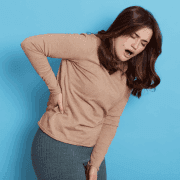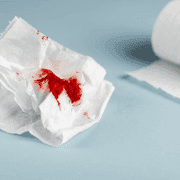Hemorrhoids After Pregnancy: What to Expect
In This Article
Hemorrhoids After Pregnancy: What to Expect
Elena
Updated on October 09, 2024
Medically verified by Dr. Arya
Fact checked by Dr. Fazeela

Proctology
5 min read
Pregnancy is a beautiful journey, but it comes with its share of physical discomforts.
Hemorrhoids, also known as piles, are one of the most common issues that many women experience during pregnancy and after delivery.
A common question new mothers have is whether these hemorrhoids will go away on their own after pregnancy.
In this blog, Mykare Health will explore the causes, symptoms, and natural course of hemorrhoids, and provide insights into whether they resolve without medical intervention.
What Causes Hemorrhoids During and After Pregnancy?
Hemorrhoids are swollen veins in the lower rectum and anus, which can cause pain, itching, and discomfort. As the body undergoes various changes to support a growing baby, the pressure on the pelvic region increases, leading to the development of hemorrhoids.
Hemorrhoids are mainly caused by increased pressure on the veins in the rectal area, and pregnancy creates the perfect storm for this to happen. Some contributing factors include
-
Increased Pressure from the Growing Uterus: As the uterus grows, it places pressure on the veins in the pelvis and lower rectum, making it harder for blood to flow back up to the heart. This leads to swollen veins, or hemorrhoids.
-
Constipation: Many pregnant women experience constipation due to hormonal changes, which can result in straining during bowel movements. Straining can increase pressure on rectal veins, leading to hemorrhoids.
-
Increased Blood Volume: Pregnancy increases blood volume, which puts extra strain on veins, especially those in the lower body. This increased volume can lead to the formation of hemorrhoids.
-
Labor and Delivery: During labor, the intense pushing and straining can cause hemorrhoids to develop or worsen, making postpartum hemorrhoids a common issue.
Will Hemorrhoids Go Away on Their Own?
The good news is that in many cases, hemorrhoids do go away on their own after pregnancy. As the body returns to its pre-pregnancy state, the pressure on the pelvic area decreases, and so does the likelihood of hemorrhoids.
However, how quickly hemorrhoids resolve can vary depending on several factors, including their severity, overall health, and postpartum recovery practices.
Here’s what typically happens
-
Minor Hemorrhoids: Small hemorrhoids often shrink and resolve within a few weeks after childbirth. As the body heals and bowel movements become more regular, the swelling in the veins decreases.
-
Severe Hemorrhoids: Larger hemorrhoids may take longer to heal or may persist, causing discomfort and requiring treatment. In some cases, if they don’t resolve on their own, medical intervention may be needed.
-
Postpartum Hormonal Changes: The drop in pregnancy hormones after childbirth can help alleviate hemorrhoid symptoms. However, constipation is still common in the postpartum period, and managing this effectively can help speed up recovery.
 5 min read
5 min readDon't Ignore Bummy Pain: Could It Be Piles?
 7 min read
7 min readBlood In The Stool: A Sign You Shouldn’t Ignore
 6 min read
6 min readSitting All Day Wreaking Havoc? It Might Be Piles!
Get a Callback Now
How to Manage Hemorrhoids After Pregnancy?
While hemorrhoids may resolve on their own, there are ways to ease discomfort and help the healing process along. Here are some steps to consider
-
Dietary Changes: Eating a fiber-rich diet is key to preventing and managing hemorrhoids. Foods like whole grains, fruits, and vegetables help soften stools, making bowel movements easier and reducing the need to strain. This can relieve pressure on hemorrhoids.
-
Stay Hydrated: Drinking plenty of water is essential for softening stools and keeping the digestive system functioning well.
-
Avoid Straining: Straining during bowel movements puts extra pressure on the veins in the rectal area. Make sure to avoid sitting on the toilet for prolonged periods and use a stool if needed to maintain good posture.
-
Sitz Baths: Sitting in warm water for 10-15 minutes a few times a day can help reduce swelling and discomfort associated with hemorrhoids.
-
Use Ice Packs: Applying cold compresses or ice packs to the affected area can reduce swelling and provide relief from pain.
-
Topical Treatments: Over-the-counter creams or ointments designed for hemorrhoids can soothe irritation and reduce swelling. These often contain ingredients like witch hazel, hydrocortisone, or lidocaine for pain relief.
-
Stool Softeners: If constipation persists, stool softeners can make bowel movements easier and reduce strain. Always consult with a healthcare provider before using medications postpartum.
-
Kegel Exercises: Strengthening the pelvic floor muscles with Kegel exercises can help improve blood circulation in the rectal area and prevent hemorrhoid recurrence.
When to See a Doctor?
While most hemorrhoids improve on their own, there are instances when medical treatment may be necessary. You should consult a healthcare provider if
-
Hemorrhoids persist for more than a few weeks without improvement.
-
You experience severe pain, bleeding, or infection.
-
The hemorrhoids prolapse, meaning they protrude outside the anal opening and do not retract on their own.
-
You notice a significant change in your bowel habits or stool appearance.
-
In such cases, treatments like rubber band ligation, sclerotherapy, or surgical removal may be recommended by a doctor. These procedures can provide lasting relief from persistent or severe hemorrhoids.
Hemorrhoids are a common but manageable postpartum issue. While many women experience hemorrhoids during pregnancy and after childbirth, they often go away on their own as the body recovers.
Adopting healthy lifestyle habits like eating fiber-rich foods, staying hydrated, and practicing good bowel habits can help speed up recovery and prevent future hemorrhoids. However, if the hemorrhoids are severe or persistent, don’t hesitate to seek medical advice for proper treatment.
Common During Pregnancy: Hemorrhoids are common due to increased pressure on the rectal veins, especially in the later stages of pregnancy and during labor.
Postpartum Recovery Helps: In many cases, hemorrhoids shrink or go away on their own a few weeks after delivery.
Manage with Fiber: A fiber-rich diet can help prevent constipation and reduce the strain that leads to hemorrhoids.
Hydration is Key: Drinking plenty of water keeps stools soft and helps in managing hemorrhoids.
Avoid Straining: Minimizing strain during bowel movements can prevent further irritation and speed up healing.
Home Remedies Work: Sitz baths, cold compresses, and over-the-counter creams can help soothe and heal hemorrhoids.
Exercise Can Help: Kegel exercises improve blood circulation and strengthen pelvic muscles, preventing hemorrhoid recurrence.
Seek Medical Help if Necessary: If hemorrhoids persist or cause significant discomfort, consult a healthcare provider for treatment options.
Avoid Prolonged Sitting: Sitting for long periods, especially on the toilet, can worsen hemorrhoids.
Medical Interventions are Available: For severe cases, treatments like banding, injections, or surgery can provide relief.
Source Links
American Pregnancy Association
Mayo Clinic



